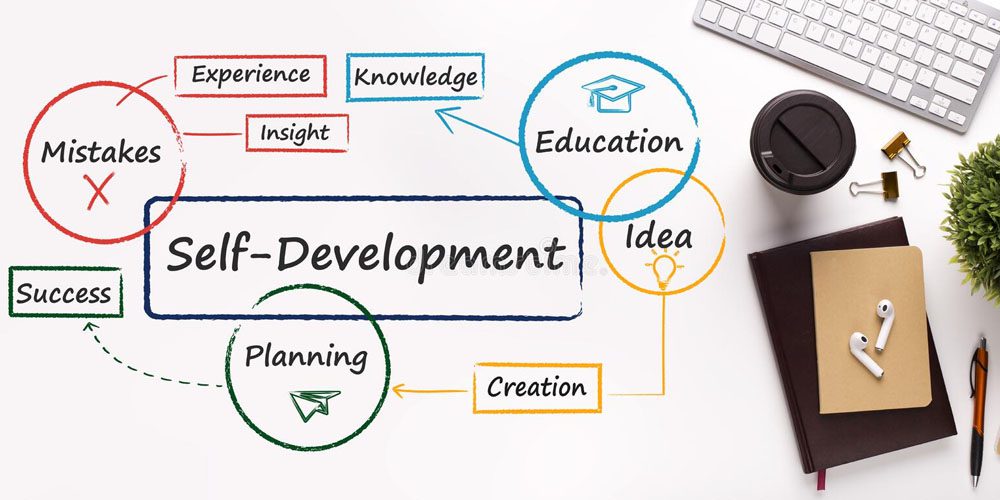Every person has the potential to improve and become the best version of themselves. It takes time, effort, and the willingness to identify areas in which you can grow. Whether you want to better yourself professionally, personally, or spiritually, there are ways to discover what areas need improvement to reach your goals.
In this blog post, we will take a look at five steps that can help uncover specific areas you can develop through personal growth. From developing meaningful relationships with others to investing in yourself, these steps can provide insight into how you can make progress and realize your aspirations. We’ll look at why self-improvement is essential and how it ties into our day-to-day lives. Lastly, we’ll review some tips for achieving success with personalized objectives and increased determination.
No matter your current circumstances or goals for the future, taking small steps toward self-development will bring immense rewards that translate into all aspects of life. Let’s begin by exploring what personal development is and why it matters so much.
Definition of Personal Development
Personal development is a broad term that encompasses a wide range of activities and approaches that focus on improving the individual’s overall well-being, skills, capabilities, and growth. It is a process that involves taking an honest look at yourself, with the goal of identifying areas for improvement and then implementing strategies to attain those improvements. It can involve developing greater self-awareness, developing new skills and knowledge, setting goals or objectives to reach your desired outcomes, exploring career options, strengthening relationships with others and engaging in spiritual activities such as meditation or yoga.
Personal development is not confined to any particular area; it can include any activity or experience that results in increased self-awareness and understanding. It is closely linked to positive thinking and personal growth. Self-improvement can help you gain confidence in your abilities, achieve success at work or school, find meaning in life through relationships with others or religion, foster creativity and problem-solving skills, and become more emotionally balanced.
Personal development has been known to improve your physical health as well. Studies show that people who practice self-care activities such as exercise and healthy eating habits often experience increased physical well-being along with improved psychological functioning. Furthermore, participating in relaxation practices such as yoga or mindfulness can reduce your stress levels while also providing opportunities for reflection on life’s meaning and purpose.
Ultimately, personal development is about becoming a better version of yourself through meaningful reflection on your life – exploring your emotions, thoughts and behaviors to uncover your true self so you may live a fulfilling life enriching yourself from within.
Benefits of Self-Improvement
Now that we have identified what self-development is, let’s take a closer look at the benefits that this provides for anyone who’s putting in the work. Here are some of the many benefits of engaging in self-improvement activities.
1. Increased Self-Confidence: Engaging in self-improvement activities can increase your feelings of efficacy and confidence. These activities allow you to gain a better understanding of your strengths and weaknesses, helping you build up the necessary skills needed for success. With a heightened sense of belief in yourself, you may be more likely to take risks and make decisions confidently.
2. Improved Productivity: Regularly engaging in self-improvement can improve efficiency and organization while also providing clarity on what needs to be done in order to reach desired outcomes or goals. Having a clearer plan on how to approach different tasks will help ensure that time is being used effectively and efficiently when working towards personal objectives.
3. Better Physical Health: Studies have shown that taking part in self-care activities such as exercise or eating healthy meals can reduce stress levels while improving physical well-being overall — leading to increased energy levels, improved sleep quality, and reduced risk for chronic illnesses like high blood pressure or heart disease.
4. More Meaningful Relationships: Working on various aspects of yourself such as communication skills can help strengthen relationships with friends, family members, partners, etc., by improving interactions with others through active listening and open dialogue about feelings or problems that may arise during daily life.
5. Increased Job Security: By improving upon various aspects such as interpersonal skills, communication abilities and technical knowledge, you can increase your job security by becoming a more valuable asset to your employer. This could potentially lead to more advanced positions within organizations or promotions.
6. Improved Networking Opportunities: Enhancing networking abilities through self-improvement activities can open up new opportunities that may have otherwise been missed. Building relationships with colleagues or attending workshops and conferences related to your field of work can provide invaluable connections that could later prove beneficial when seeking out new job opportunities or expanding a business.
7. Stronger Business Strategies: Working on yourself professionally through set objectives to master certain tasks or take on extra responsibilities is essential for ensuring that any business strategy implemented is successful, as having a thorough understanding of the goals at hand and how to go about attaining them will ensure nothing falls through the cracks during the process.
8. Achieving Greater Satisfaction in the Workplace: Studies have shown that individuals who engage in regular self-development activities report higher levels of satisfaction with their lives overall – resulting from feeling accomplished because of all the progress made throughout their journey towards personal growth and development.
Overall, engaging in self-development and self-improvement is beneficial for both your personal growth and mental health as it provides you with a greater sense of control over your life; enabling you to become a happier version of yourself by pushing aside limiting beliefs that may be preventing you from reaching your personal or professional goals.
Step 1: Identify Your Goals and Objectives
Setting SMART Goals
Setting SMART goals is a key part of self-development. SMART stands for Specific, Measurable, Achievable, Realistic, and Time-bound.
SMART is a memorable acronym used to create achievable goals within an appropriate time period. To maximize the potential for self-growth, taking advantage of SMART goal setting can be incredibly beneficial. Here’s how it works:
1. Setting Clear Outcomes: By providing clarity on the desired outcome from the very beginning and breaking down larger goals into smaller tasks, you are able to better focus on what it takes to accomplish each objective. Having clear objectives also prevents distractions and helps keep you motivated due to the progress made when hitting certain milestones along the way.
2. Attainable Benchmarks: Constructing actionable plans that can be evaluated over time makes it easier to track progress while keeping yourself accountable at all times. When done properly, setting SMART goals enables you to develop a greater understanding of your capacities while learning where you need to improve in order to reach desired levels of success.
3. Prioritization of Tasks: Knowing which tasks should take priority based on their level of importance allows you to engage in more effective time management techniques and optimize effort towards tasks with higher chances of producing successful outcomes as opposed to getting sidetracked by those with lower yields or rates of return.
4. Increased Self-Awareness: Regularly articulating desired outcomes can help you gain a better understanding of yourself – in terms of your values and strengths – which can lead to enhanced self-confidence during times when things don’t quite go according to plan. This heightened awareness could also result in improved decision-making when it comes to personal and professional matters as well as relationships with others in general.
Looking at Your Everyday Habits
Looking at your everyday habits is a great way to optimize self-improvement. Oftentimes, it can be difficult to acknowledge how our daily activities impact our overall goals, so taking a step back and analyzing our individual behaviors can be incredibly beneficial in this regard. Here are some tips for examining your everyday habits:
1. Make a List of Your Habits: The first step is to document your current behaviors – both good and bad – on paper. This could include practices such as staying up late, scrolling through social media platforms, or drinking more caffeine throughout the day than necessary. Seeing the list in writing allows us to better visualize any changes that need to take place in order for progress toward a desired outcome to occur.
2. Trace Your Habits To Their Roots: Digging deeper into each habit can help you discover what causes them and why they came about in the first place – whether it be from stress from work, lack of sleep or unhealthy relationships with others. Doing this will not only provide you with further insight but also provide opportunities for change when identifying where improvements can be made in terms of behavior or lifestyle choices.
3. Replace Unhelpful Habits with New Routines: Changing existing habits is arguably the most challenging part of this entire process since we are creatures of habit and don’t always respond well to disruption in our routines. It’s important however, to find ways to substitute existing bad habits with new ones that bring us closer to achieving our long-term goals – whether it be joining a gym class or setting aside time after work every day for reading a book that brings joy into your life.
Examining Your Skills and Strengths
Examining your skills and strengths is an essential part of self-improvement. Taking the time to understand what you are good at, or areas that could use improvement can give you an edge when it comes to reaching success in life. It is important to keep learning by staying up-to-date with the latest trends and educating yourself on new topics in order to stay relevant. Moreover, getting feedback from those close to you can provide additional insight into your capabilities.
Ultimately, taking the time to evaluate your skill set is beneficial for identifying areas that need improvement, as well as providing valuable insight into individual strengths that could be useful during personal growth opportunities.
Listing Areas That Need Improvement
Identifying areas that need improvement is an important part of self-development. Taking the time to analyze your skillset can help you recognize aspects that could use improvement and open you up to new possibilities for growth. Here are some tips on how to effectively list areas that need improvement:
1. Identify Your Weaknesses: Take the time to assess yourself honestly, and ask those close to you for honest feedback, in order to get a clear picture of your weak points. Being aware of these areas will allow you to focus on improving them in order to reach success.
2. Break Down Big Goals: When attempting something new, break down big goals into smaller, more manageable tasks. This process will help you gain confidence as you accomplish each small goal and eventually tackle the bigger picture.
3. Set Realistic Expectations: Unrealistic expectations can lead to feelings of discouragement and hinder progress toward making improvements in certain areas. Set realistic standards for yourself by starting with small objectives and increasing complexity as you build upon successes achieved at lower levels.
4. Track Progress: Tracking progress is important when assessing where improvements need to be made or when trying out something new. Keeping track of milestones achieved or lessons learned along the way will provide greater insight into which skills require more attention or how much progress has been made thus far.
Step 2: Take Inventory of Your Support System
Reflect on the People Around You Who Bring Out the Best in You
The people we surround ourselves with have a huge impact on our lives. The right people can bring out the best in us and bring positivity into our lives, even during tough times. Reflecting on the people that bring out the best in you is an excellent way to identify positive influences and learn how to strengthen relationships in order to make a better future for yourself.
The first step towards reflecting on our relationships begins with being mindful of those around us who treat us with kindness and understanding. This means not taking their generosity for granted and appreciating them for their positive attributes. For instance, if you find yourself feeling more motivated when working with someone or were inspired by their confidence, take note of these feelings so that you can use this guidance in your own life.
It is also helpful to think about any advice or words of wisdom that meant something special to you coming from someone else’s mouth. Don’t be afraid to reach out and thank them for their influence when necessary as this will foster strong relationships between each other. Additionally, keep track of any inspiring moments that happened while spending time with somebody special – it could be anything from attending a meaningful event together or having a deep conversation over dinner. Thinking back on these moments not only helps remind us why we value our friends and family, but also encourages personal development.
Acknowledge Those Who Provide a Sense of Security and Belonging
It can be a challenge to feel secure and find a sense of belonging in life, but having supportive people around us can make all the difference. We should never take for granted those who provide us with a sense of security and belonging; instead, we should take time to acknowledge them.
Acknowledging those who provide us with a sense of security and belonging will not only show them how much they mean to us, but also let them know that we appreciate their presence in our lives. Acknowledging someone could range from simply thanking them for providing support when we needed it most or sending them meaningful messages expressing our gratitude for their friendship.
Moreover, acknowledging someone doesn’t have to be limited to words – it can also come in the form of thoughtful gestures such as making dinner for them or inviting them out on an adventure you both can enjoy together. Such acts help strengthen the bond between each other while providing a comfortable environment where both parties can gain a further understanding of one another.
At times it is hard to express ourselves fully and reach out to others, but even small acts of kindness can go a long way towards showing our appreciation. Acknowledging those who provide us with a sense of security and belonging will ensure that they know just how valuable they are in your life.
Identify Sources of Inspiration
Finding sources of inspiration can be a great way to push ourselves out of our comfort zone and reignite our creativity. Identifying the sources of inspiration in your life can help you focus on what is important to you, come up with new interesting ideas, and achieve a balance between work and leisure.
One source of inspiration are people around us. Connecting with like-minded people who share similar interests or outlooks is a great way to find motivation in life and generate fresh perspectives on problems we face. Mentors, friends, family members – all these relationships have the potential to open up new possibilities for us. Listening to personal stories from these individuals can serve as an excellent source of motivation as it reminds us that we’re not alone in our struggles – someone else has gone through something similar and achieved success.
Nature is also an amazing source of inspiration and rejuvenation – whether it’s taking a walk in the park or going on a hike, the beauty and wonders of nature allow us to feel one with the world. Nature helps us decompress after prolonged periods of stress while providing us with much needed peace and quiet – allowing us to reflect freely without interruption or distraction.
Step 3: Learn to Listen to Yourself and Trust Your Instincts
Understanding Your Psychology and Beliefs
Taking the time to understand your own psychology and beliefs is essential for personal growth as it allows you to become more aware of who you are and your individual values. By understanding your psychology, beliefs, and motivations you can better direct your life towards achieving meaningful goals.
In order to start this journey of self-discovery, it’s important to recognize how the way we think affects our day-to-day decisions; what motivates us when making tough choices? What are our strongest beliefs? Being able to articulate these thoughts will help us take ownership of them instead of being influenced by external sources.
You should also be mindful of how you interact with others – questioning if your actions reflect your true self or if they have been shaped by preconceived notions or ideas from those around you. By asking yourself difficult questions such as these, you can better understand the emotions that drive you forward and become more aware of any patterns which may hinder your progress in life.
Understanding your psychology and beliefs is a continuous process – it takes dedication and effort to constantly reflect on yourself as well as learning from each experience. With effort comes reward – being able to use this knowledge for meaningful growth will translate into improved relationships with those around you and set you on course for a life full of fulfillment.
Pay Attention to Signs from Within
Paying attention to signs from within is essential for making meaningful progress in life. We often rely heavily on external sources of validation but this often leads us to lose sight of our true passions and values. By paying attention to the signs from within us, we can begin to become more self-aware and tap into our inner wisdom.
The first step is to take ownership of your thoughts and feelings – allowing yourself a moment to pause and reflect on why you feel a certain way. By practicing mindfulness techniques such as meditation, you can become more aware of the subtle signals that your inner voice is sending you. This can be beneficial for both personal and professional development as it helps you make decisions that are informed by intuition rather than habit or routine.
Another important factor to consider when connecting with your inner voice is environmental awareness – what sounds, smells or sights instantly induce positive emotions? When spending time outside in nature, try taking note of the different colors, textures, and details around you – this practice can help you discover beauty in everyday moments and create a sense of connection with the world around you.
Step 4: Know How to Spend Quality Time with Yourself
Making Room for Mental Health Breaks
Quality time spent with yourself is essential for overall mental health and well-being. Allocating time to disconnect from daily stressors and reconnect with your inner thoughts is one of the most powerful forms of self-care that you can do.
Quality time with ourselves requires deliberate effort – it’s not enough to simply sit around and do nothing, this only creates a sense of stagnation. Instead, set aside dedicated timeslots where you can engage in activities that bring you joy or help you relax such as reading a favorite book, listening to music, or practicing yoga. Make sure these activities are free from distractions so that you can truly appreciate the moment for what it is.
Spending quality time with yourself doesn’t have to mean isolating yourself from the world – even engaging in simple interactions such as talking to friends or attending social gatherings can be beneficial in providing mental clarity and room for creativity. Taking small breaks throughout the day can also make a difference – short walks or a few minutes spent watching nature can provide us with energy and an opportunity to clear our minds.
Participation in Thought-Provoking Activities
Participating in thought-provoking activities is a great way to cultivate mental strength and explore your own creativity. By engaging in activities that challenge us, we can develop new perspectives and problem-solving skills, as well as gain insight into the deeper complexities of ourselves and our world.
Whether it be debating about the latest news topics or playing complex board games, taking part in these types of activities helps exercise your mind and encourages you to think critically. Try to choose an activity that resonates with you – this could be anything from playing an instrument to solving puzzles or writing stories.
When you’re participating in an activity that challenges you mentally, make sure it’s also fun and stimulating. This will ensure that it remains engaging over a period of time and keeps your interest piqued. It’s also important to make sure you give yourself room to grow – don’t be afraid to make mistakes or take chances when expressing yourself.
Involvement in thought-provoking activities is not only great for improving your cognitive abilities but can also enhance your sense of self by providing unique insights into how you think and work. So why not give it a try?
Step 5: Invest in Growth Opportunities
Elaborate on Interests and Passions
Investing in your interests and passions is essential for personal growth. From exploring different areas of study to honing existing skills, taking the time to focus on something that truly matters to you can open up a variety of opportunities.
It’s important to take note of what inspires and motivates you – whether it be a hobby or a career path – and then find ways to further develop your knowledge in that area. This could mean attending classes, talking with mentors, or reading books written by experts. Taking the time to invest in ourselves helps improve our confidence and stay motivated for the future.
If you’re able to attend workshops, seminars, and conferences related to your interests or passions, do so. These events provide an incredible chance to learn more about your field while having meaningful conversations with like-minded people. They also offer great networking opportunities that can potentially open doors for new projects or collaborations.
Investing in growth opportunities doesn’t just benefit you professionally – it can also have positive effects on your personal life by strengthening your character and cultivating self-discipline. So go ahead and explore – if something sparks your interest, don’t hesitate.
Pursuing Professional Advancement
Pursuing professional advancement is a great way to gain new skills, build confidence and open up new opportunities for career growth. While this could mean taking on additional responsibilities within your current role or pursuing a higher position in the company, it all starts with having a plan and setting realistic goals.
Start by identifying areas of development – are there any certifications or courses you can take that would give you an edge? Think about what sort of knowledge base you’d like to have, then research different programs or classes that could help get you there. Asking colleagues or mentors for advice can also be invaluable – they may be able to point out other helpful resources or even put you in touch with people who can offer further assistance.
Once you’ve identified some potential avenues for professional advancement, start creating an action plan that includes clear steps and deadlines so that you can stay focused. Additionally, set aside some time each week specifically dedicated to improving your skillset – actively engaging with the material helps strengthen your understanding and retention of information much more than just passive reading alone.
Finding New Challenges That Stretch You
Finding new challenges that stretch us is an essential part of self-development. Taking on something unfamiliar can seem daunting at first, but the benefits often outweigh any doubts or anxieties you may have. It’s important to recognize that stepping out of your comfort zone and pushing yourself to try something new can lead to greater personal growth and increased confidence in yourself and your abilities.
When facing a challenge, it can be helpful to break down the task into smaller actionable steps. Start by assessing the difficulty level and researching what resources may be available to help you better understand or complete the task. Consulting with a mentor or trusted colleague who has experience in the area can also provide valuable insight and guidance – don’t hesitate to reach out.
Once you’ve done a bit of groundwork, set realistic goals for yourself and create an action plan that details what needs to be accomplished – this could include taking classes or finding online tutorials, doing practice drills or writing drafts – whatever it takes for you to move forward.
Takeaways
Self-development is a great way to acquire new skills, become more confident in yourself and your abilities, and open up opportunities for career growth.
When taking on a challenge, break it down into smaller steps and consult with a mentor or colleague for insight and guidance.
Set realistic goals for yourself and create an action plan that details what needs to be accomplished to move forward.
Exercise patience when facing challenges, remember that learning can be just as valuable as any end result, and don’t be afraid to take risks and find opportunities to stretch yourself.
I hope this article has provided some insight into the importance of self-development and how you can actively work towards improving yourself. Now it’s time to take action – so go out there and start exploring – if something sparks your interest, don’t hesitate. With dedication and a little effort, you can achieve great things. Good luck on your journey.
As always, I’d be happy to hear from you. So please leave a comment below and let me know how you plan to use self-development in your own life.























